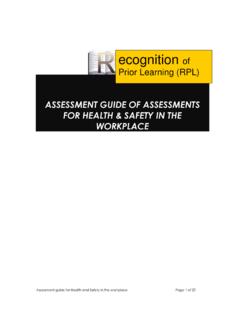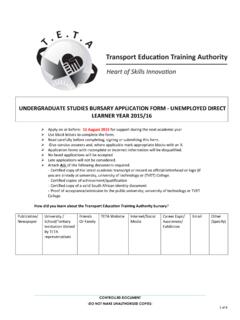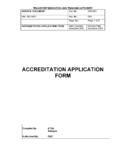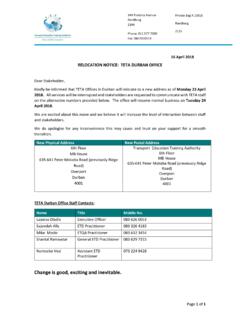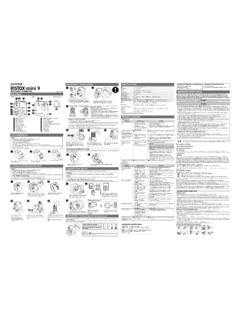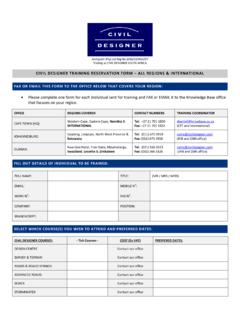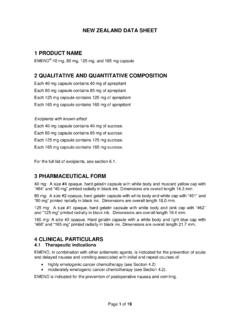Transcription of TETA Learnership Info Pack
1 TETA Learnership INFORMATION pack 05/07/2005 Revision 01 1 Learnership INFORMATION pack APRIL 2004 TETA Learnership INFORMATION pack 05/07/2005 Revision 01 2 TETA Learnership INFORMATION pack Table of Contents 1. PURPOSE OF THE INFORMATION pack 3 2. OVERVIEW 3 3. ROLE PLAYERS INVOLVEMENT IN Learnership DEVELOPMENT 8 4. STAGES OF Learnership DESIGN, REGISTRATION AND IMPLEMENTATION 10 5. STAGE ONE: INITIATING THE Learnership 12 6. STAGE TWO: DESIGN THE Learnership 15 7. STAGE THREE: REGISTER THE Learnership 17 8. STAGE FOUR: DEVELOP THE Learnership 19 9.
2 STAGE FIVE: PREPARE FOR AND IMPLEMENT THE Learnership 24 10. STAGE 6: MONITOR & EVALUATE THE Learnership 28 11. APPENDICES 29 TETA Learnership INFORMATION pack 05/07/2005 Revision 01 31. Purpose of the Information pack The purpose of this Learnership information pack is to provide you, the employer, learner or provider with a definitive set of documents to guide you through the various stages of Learnership development and implementation.
3 The design of the pack is such that you may select only those sections that are pertinent to you. The overview section pertains to all readers and provides some background information on learnerships. The information pack provides information and guidelines for each stage of learnerships, pro-forma documents and templates, as well as specific information for providers, learners, and employers. Professional bodies may utilise the information pack as a basis from which to add their specific requirements. 2. Overview Background The current legislation, in the form of the Skills Development Act and Skills Development Levy Act, has been enacted in order to implement structures and processes to transform skills development in South Africa.
4 A critical look at how employers and training providers have provided education, training and work experience in the past indicates that education and training provision has not always been responsive to the demands of the economy nor has it always linked theory and practice. Learnerships offer one way in which education and training can become more responsive to the needs of employers, learners and the social and economic needs of South Africa in general. Learnerships are intended to address the gap between current education and training provision and the needs of the labour market.
5 Some of the labour market issues that learnerships seek to address are: the decline in levels of employment in South Africa; the unequal distribution of income, unequal access to education and training, and employment opportunities; the effects of race, gender and geographical location on advancement; and TETA Learnership INFORMATION pack 05/07/2005 Revision 01 4 the skills shortage amongst the labour force Learnerships are thus viewed as a central mechanism for achieving this transformation. What is a Learnership ? A Learnership is defined as a work-based route for learning and gaining qualifications.
6 It includes both structured work experience (practical) and structured institutional learning (theory). In other words it includes both on the job and academic components. A Learnership is not the only way to gain a full NQF qualification but does offer a very specific approach. The criteria for a Learnership are set out in the Skills Development Act. These indicate that the Learnership must: consist of a structured learning component include practical work experience be governed by an agreement between the learner, employer and education and training provider lead to a qualification registered on the NQF and relate to an occupation Learnerships also require job rotation, on-going mentorship and assessment in order to fully support the learner.
7 More information can be found through the following sources: Department of Labour Skills Development Act 1998 (No 97 of 1998) The Department of Labour web-site (which also includes the Skills Development Act) The German Technical Co-operation has also published a number of books on qualification and Learnership design and implementation. These can be accessed through contacting Mrs Santa de Jager phone (012) 342-3626, fax (012) 342-3522, email Benefits of engaging in Learnership learning programmes The following advantages could be derived from engaging in Learnership programmes: Well and appropriately skilled employment pool (existing employers and new entrants); Turnover increase because of productive learners at lower than normal costs; Productivity increase because of higher skilled workers.
8 TETA Learnership INFORMATION pack 05/07/2005 Revision 01 5 Ensure recruitment success, as the employer will be able to retain performing new entrants; Creative and innovative workforce, because of the attainment of the compulsory critical skills and attitudes required by every qualification; An increase in market share because of a skilled and competitive workforce; A satisfied workforce and subsequent labour peace; A highly motivated workforce, because of higher levels of participation in the success of the company. (Extract taken from Department of Labour Learnership Implementation Guideline) National Standards for Education and Training All training offered through a Learnership will need to culminate in unit standards and qualifications registered on the National Qualifications Framework.
9 Learnerships will always culminate in a NQF full qualification. These standards / qualifications clearly indicate the actual learning outcomes that the learner is expected to achieve. Learnership Agreements The learnerships are formally registered by SETAs with the Department of Labour. Learners, employers and training providers are then required to sign Learnership agreements prior to the implementation of the Learnership which hold all three parties to certain obligations. Quality Assurance Quality management and assurance are integral to the Learnership system. Quality of training is achieved through the following mechanisms: Learnerships are registered with the DoL and undergo an evaluation based on set criteria.
10 The accreditation of employers as workplace providers and assessors by the SETA ETQA ensures that the workplace becomes a centre of quality for the provision of education and training. Learnership Grants Learnership grants will be available for the implementation of learnerships that meet TETA s Sector Skills Plan objectives and criteria. TETA Learnership INFORMATION pack 05/07/2005 Revision 01 6 Funding Policy According to the funding regulations of the Department of Labour, a SETA may use a percentage of its levies as well as any residual levy income that is not claimed by employers in respect of levy-based grants, to make the following categories of discretionary strategic grants: Learnership grants; skills programme grants.
